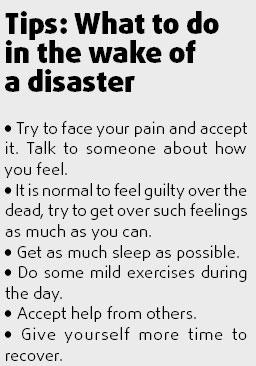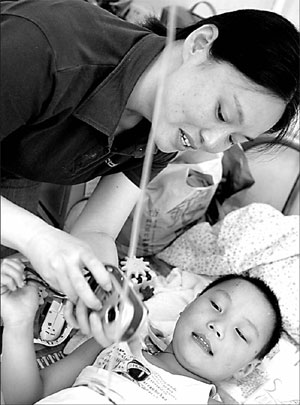Focus is on treating trauma
The mother of two appeared strangely cold and calm, shedding no tears. She seemed numb and wore a blank expression, as if all blood had drained out of her.
Speaking to the woman in a crowded tent for quake victims, counselor Yang Pude found out that the 30-year-old had lost five family members in the disaster - her husband, parents and parents-in-law.
"The peace she displayed was only at the surface, in effect, she was deeply depressed inside," Yang said.
"She needed someone to pour out her grief to."
|
Psychologist Ke Xiaoyan from the Ministry of Health gives psychotherapy to 7-year-old boy Xie Rui in Chengdu Children's Hospital in Sichuan province, yesterday. Xie broke his leg during last Monday's quake. Xu Jinxing |
The vice-director of the Beijing Huilongguan Hospital (BHH) had provided emotional support to more than 30 quake victims by Sunday morning in Pengzhou, 40 km from provincial capital Chengdu.
Yang led Beijing's first professional psychological rescue team sent by the BBH on May 17, five days after the earthquake shook Sichuan province.
The team's 22 members, half of whom are women, include experienced psychotherapists, psychiatrists and nurses. Their average age is above 30 years.
After their arrival, the team was divided into three detachments and headed to different afflicted areas.
Providing emotional support for disaster victims is critical for preventing and reducing mental disorders, Yang said.
Group counseling for the quake victims is being widely adopted. For those with serious psychological problems, an individual interview will be arranged.
In the case of the mother of two who lost five of her loved ones, Yang spent more than half an hour with her, urging her to fight on - not just for herself, but also for the sake of her children, aged 2 and 1.
"I will keep an eye on her, " Yang said. "If she needs someone to talk to in the following weeks, I will be there for her."
Risks involved
Many suffer from mental illness after disasters, as they do not know how to cope with the sudden stress, psychologists have said.
In general, a person's first response to an unexpected event might be feelings of helplessness, desperation and denial of the traumatic event.
Such feelings will last no more than a few days until the victim comes to grips with reality - and suffers serious depression.
"Many victims have appeared anxious and nervous. Some have suffered from insomnia, especially following aftershocks of the quake," Yang said of the quake victims.
Despite having gone through the same disaster, each victim's psychological problem is different, Yang said.
Some cannot bear the pain of losing their loved ones, while others are anxious to find missing relatives or suffer from the loss of their possessions in the disaster.
"At the moment, the most important thing is to have people speak out their feelings and thoughts of the quake," Yang said.
He explained that the psychologists were trying to make victims aware that it was natural to experience such feelings after going through a disaster.
"Don't be afraid and ignore them, as they won't go away, and will only become more of a problem later. Just face your pain and grief, and talk to us, or relatives, or friends," he said.
Before Yang left Beijing, the doctor used to worry about building up trust between himself and his patients in a short period. To his relief, people welcomed the counselors with open arms, and really appreciated their help.
His concern is now adequate medical supplies.
"We need more medical supplies for the sufferers, and we also need more quiet areas to provide counseling for them," Yang said.
Besides the victims and their relatives, the team leader said that rescuers - such as soldiers, police and doctors - also need emotional support, to ease their tension after working in such trying conditions.
Yang's team will stay in Sichuan for two weeks.

To raise awareness of crisis counseling, the Huaxia Psychological Education Center also compiled a brochure and sent more than 10,000 copies of it to Sichuan for distribution yesterday.
Similarly, a hotline will be set up within a month to provide emotional support for quake victims. So far, more than 150 volunteers have applied to help with the hotline.
The center's director, Wei Shiwei, said that it takes a long-term view of offering counseling to those people with mental illnesses, even if their quake-hit homes are rehabilitated in the future.
Up to 23 percent of the survivors of the Tangshan Earthquake in 1976 have suffered from post-traumatic stress disorder, constantly struggling with the memories of the disaster.
The same might apply to those in Sichuan, Wei said.
"It is clear that people have raised awareness of psychological crisis intervention, as various psychological teams have been working in the afflicted areas to help people. On the other hand, there is a pressing need to establish a national system for the field, for long-term planning and centralized supervision," he urged.
(China Daily 05/20/2008 page17)









